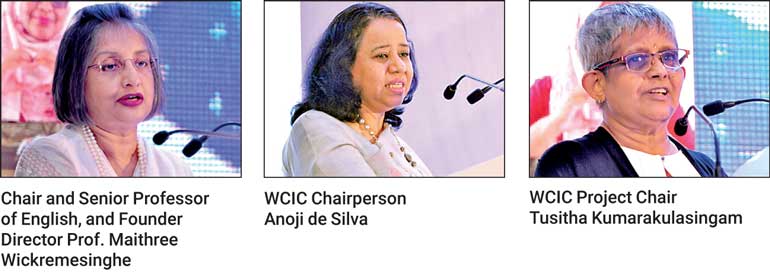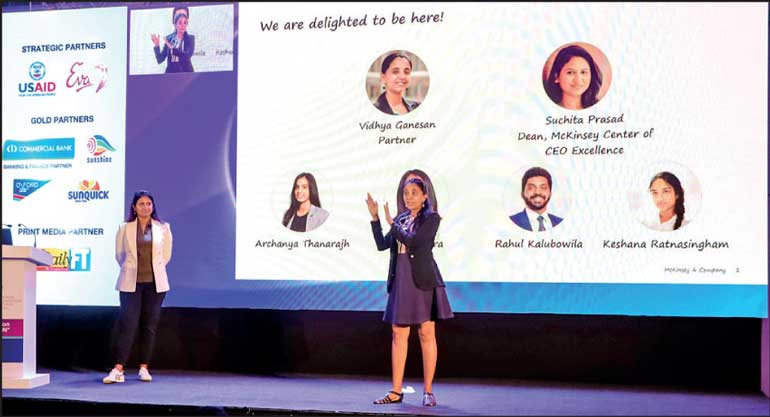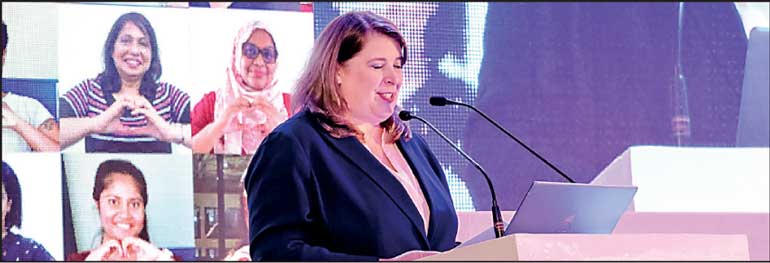Thursday Feb 26, 2026
Thursday Feb 26, 2026
Tuesday, 19 March 2024 01:10 - - {{hitsCtrl.values.hits}}



CIPE Director for Women’s Economic Empowerment Barbara Langley
By Charumini de Silva
Chair and Senior Professor of English, and Founder Director Prof. Maithree Wickremesinghe last week made a compelling case for the critical role of economic inclusivity, particularly in advancing the status of women and driving overall prosperity.
Delivering the keynote address titled ‘Inspire Inclusion for Economic Prosperity’ at the Women Leadership Forum 2024 organised by the Women’s Chamber of Industry and Commerce (WCIC), she called for concerted efforts to realise the full potential of inclusivity as a driver of innovation, productivity, profitability and economic sustainability.
“Studies worldwide have repeatedly shown that inspiring the economic participation for women, in particular, has led to positive outcomes including poverty level reduction, poverty divide on healthcare, education, families and eventually to the overall economic prosperity,” she said.
Acknowledging the global shift towards promoting private sector-driven inclusive sustainability and growth, Prof. Wickremesinghe stressed the urgency of addressing inclusivity issues that have been long-standing topics of discussion across various forums, such as the UN, international organisations, NGOs, the ILO and so on.
“Despite decades of discourse, it still seems uncertain or unconvinced as to why women should be encouraged, supported, accounted for and integrated into the spheres of society, industries and economy,” she claimed.
In the context of Sri Lanka’s current challenges, Prof. Wickremesinghe underscored the importance of achieving equality in opportunities, resources, and wealth distribution. “Often amidst crisis, social policies should not be postponed — but rather, opportunities should be created, and resources allocated to foster inclusivity and economic prosperity,” she explained.
Moving beyond slogans and policies, Prof. Wickremesinghe called for tangible organisational measures to eliminate gender bias and stereotypes. However, asserted that identities are neither stable nor can they be exclusively compartmentalised.
“We need to be mindful of different intersections in a people’s identity as well,” she added.
Prof. Wickremesinghe said it is important to provide visibility, voice, and acknowledgement to all stakeholders, ensuring that inclusivity becomes ingrained in organisational culture and practices. “Today, we often see people are compelled to sit through meetings where all stakeholders are not even allowed to participate actively,” she added.
She advocated for a comprehensive approach to inclusivity, viewing it as both a development imperative and a strategic business strategy. She insisted on the need to prioritise inclusivity, with a particular focus on women, while also recognising the diverse dimensions of inclusivity beyond gender, including age, disability, religion, caste, and LGBTQAI status.
Highlighting the broader objectives of the Sustainable Development Goals (SDGs), Prof. Wickremesinghe noted that inclusivity is fundamental to achieving the goal of leaving no one behind, particularly women.
“Although constitutional guarantees of equality and strides in women’s education — labour force participation among women in Sri Lanka remains relatively low,” she asserted.
Prof. Wickremesinghe pointed out that while the pandemic provided some flexibility for women in the workforce, the majority of women are still engaged in the informal sector, highlighting the demographic case for economic inclusion.
Citing data from the Census and Statistics Department she highlighted, that in 2022, women’s participation in the labour force was 32.1% as against 17.5% of men due to the flexibility offered by organisations during the pandemic. In 2021, over 60% of women in the workforce were in the informal sector, implying the demographic case for economic inclusion for Sri Lankan women.
“According to data, 67.9% of them have potentially been left out given the vast untapped resources of Sri Lanka. Given the low rate of participation, 67.9% of women are not earning an income, which is about 8.67 million of 22 million population,” she added.
She said preventing women from working due to ‘expected caregiving responsibilities’ places a significant burden on them, undermining their productivity and contributing to lower economic growth. “Compared to men, women are less likely to re-enter the workforce after marriage or childbirth, further exacerbating gender disparities. The disproportionate burden of unpaid care work falls primarily on women, impacting their ability to participate fully in the economy,” she stressed.
Prof. Wickremesinghe thereby stressed the need for public services infrastructure, equitable redistribution of unpaid care work, and family-friendly policies to support women’s participation in the workforce.
She also outlined that retaining women in the workforce and providing a safe, secure and hospitable environment are crucial steps towards promoting gender equality.
She asserted the importance of recognising women as individuals before their roles as daughters, wives, or mothers is essential for empowering them to navigate their paths and determine their self-worth. Taking control of their income through earning, spending, saving and investing can empower women and enhance their sense of worth and independence.
“Promoting diversity in the workplace, including diverse aptitudes, skills, personalities and thinking styles, can lead to increased innovation, productivity, and profitability. Research has shown that businesses that embrace diversity tend to outperform others, underscoring the business case for inclusivity,” she added.
To operationalise inclusivity within organisations, Prof. Wickremesinghe suggested the WCIC conduct workshops on various levels, including legislation, policies, strategies, individual responsibilities, and organisational culture.
Additionally, she advocated for the establishment of a women-led bank to further promote gender equality and economic empowerment.
Addressing the gathering, WCIC Chairperson Anoji De Silva highlighted the visionary direction of the chamber and the numerous projects undertaken to enhance the economic participation of women in Sri Lanka. “We collaborate with like-minded organisations to amplify our impact, and Centre for International Private Enterprise (CIPE) and McKinsey and Company are two such partners aligned with this event. We invite every businesswoman in this audience to join the formidable organisation WCIC.”
Discussing the structure and agenda of the event, Event Chairperson Tusitha Kumarakulasingam said: “The Forum expanded on the International Women’s Day theme ‘Inspire Inclusion – Count Her In,’ with sessions designed to provoke thought on creating a safe workplace for optimal performance.”
CIPE Women’s Economic Empowerment Director Barbara Langley elaborated on their commitment to support these initiatives, sharing the research findings, while Naushalya Rajapakse shed light on the current legal status related to GBVH in Sri Lanka.”
“The second half of the Forum was dedicated to delivering knowledge with a proprietary tool from McKinsey and Company on Centered Leadership. Vidhya Ganesan and Suchitha Prasad facilitated an energising, interactive session for the participants.”
“The ‘Centered Leadership’ workshop prompted engagement and self-reflection, offering valuable advice on how today’s business leaders can become the best version of themselves. Centered Leadership was defined as ‘the mastery of thoughts, feelings, and actions in pursuit of profound change within the organisation or community one leads. It means being at your best most of the time, feeling grounded yet able to rise above challenges.’“
“The Women Leadership Forum 2024” received support from Strategic Partners – Eva and USAID, Gold Partners – Commercial Bank, Sunshine Holdings PLC Sunquick, Oxford School of Business. McKinsey served as the Knowledge Partner, and the event was conducted in collaboration with CIPE.
– Pic by Lasantha Kumara